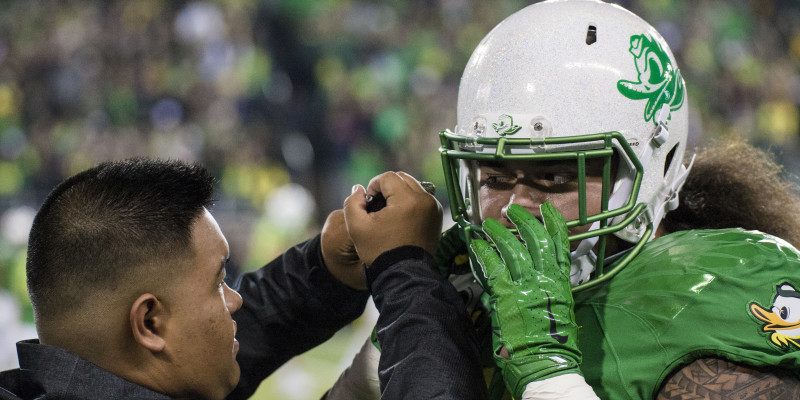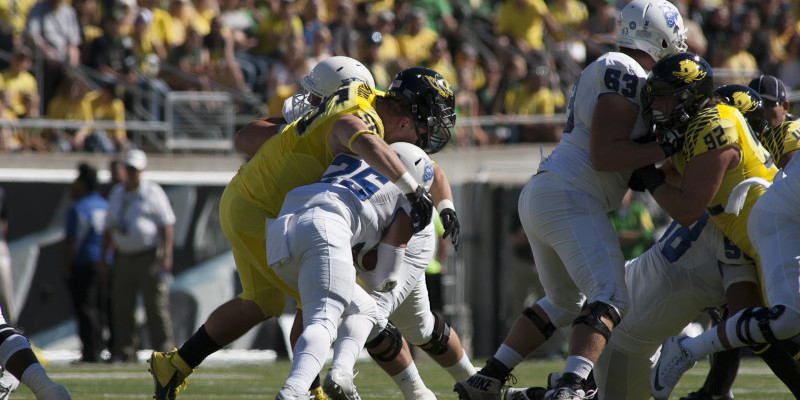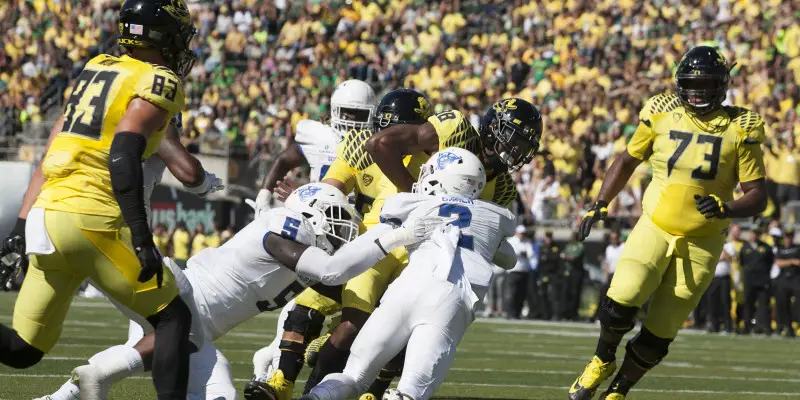Head trauma, including Chronic Traumatic Encephalopathy (CTE) damage and player safety, in general, are major areas of concern today in both the NFL and in college football (CFB). With parents and guardians concerned about head injuries, participation in youth football continues to decline. In response, a number of youth leagues have eliminated tackling in both practice and in games.
The Ivy League recently eliminated live tackling in practice. Yeah, yeah, it’s the just the Ivies – irrelevant in CFB since Prohibition. But did you know that Harvard University has more guys on NFL rosters today than do more than 20 percent of the Power 5 conference members?
Of course, and predictably, this decision by ’The Smarties’ was roundly dismissed by the majority of big time CFB coaches. This response from Pitt head coach Pat Narduzzi is representative: “We are not playing soccer!”
And we have previously heard from ‘smash mouth’ coaches such as Arkansas’s brilliant Bret Bielema who and with absolutely no statistical support, opines that spread football is more dangerous then lining up and beating one another to a pulp. Last man standing wins!
It’s okay, Bret, for centuries our ancestors believed that the world was flat. I am old enough to have watched CFB in the day of ‘3-yards-and-a-cloud-of-dust.’ Back when Woody Hayes was certain that only three things can happen when you pass the football and two of them are bad. When a QB who threw 20 times in a game was ‘airing it out.’ Believe me, today’s game is far more exciting and enjoyable.

An Oregon trainer going through the mandatory sideline concussion protocol.
Many law suits have already been filed asking for damages for assorted brain injuries. The NFL has settled one such case. This settlement included an agreement to allow less contact in practice.
It would be foolish to think that the trial lawyers like the buzzard, carrion-eaters that they are, will stop circling. Foolish to think that at some point in the near future the NCAA and/or a member school(s) will not be hit with a big judgement.
Especially when taking into consideration that players continue to get bigger and faster and basic physics tells us that this does result in greater force at the point of contact. And we have learned the hard way, via the autopsies of former NFL players who have passed on, that CTE is a ‘progressive disease.’
His brain trauma came from boxing and not football, but for those of us old enough to remember the loquacious, bombastic, articulate Cassius Clay, watching the bumbling, stumbling Mohammed Ali today is tragic.
So what say you Duck fans? Should some or all of the rule changes suggested below be adopted by the Conference of Champions? Or should we play on, knowing that we are whistling past a graveyard of liability?
To wit:
1. Eliminate live tackling and Oklahoma-like drills in practice. Instead – and like Dartmouth College – use robotic tackling dummies that will become more life like as more schools come on board and the technology improves.
PRO: Obviously cuts back on man-on-man contact. Might even help attract big time recruits who do not want to get beat up before becoming eligible for the League, to come west?
CON: Not learning to live tackle in the proper manner could lead to more in-game injuries from leading with the helmet and more head-to-head collisions. And of course the catcalls projected in the Pac-12’s direction – especially from down south – would be loud and long.
2. Shorten the game by adopting NFL timing rules including not stopping the clock on a first down.
PRO: Shorter games mean less fatigue and less chance for injury. DUH!
CON: Pac-12 individual and team stats would decrease versus other CFB teams.
3. Eliminate live kickoffs. The ‘receiving team’ starts at its own 25-yard line.

Alex Balducci with a helmet-popping hit against Georgia State.
PRO: Many of the most violent hits happen on kickoffs. Would not be that radical a change as many kickoffs today are not returnable.
CON: ‘Come on, man! You really want to eliminate Charles Nelson’s game-changing kickoff TD against ASU last season!’
4. Ties are fine. No OT in the regular season.
PRO: Fatigued at game’s end, players should not continue to compete when they are most vulnerable. CFB got along just fine for decades without OT.
CON: Unless you live in SEC country, who wants to kiss his sister?
5. With the exception of games played in Tempe and Tucson through mid-October, no Pac-12 game will start later than 2 p.m. local time.
PRO: Okay, I admit to having no stats whatsoever to prove that playing in the daylight is safer than playing at night. But the body is more flexible in warmer weather and I love tailgating at lunch – not dinner!
CON: But without ‘The Pac-12 at Nite’ how do we make the big bucks?
6. Eliminate spring football games.
PRO: Many schools have already done this and instead have a post-spring skills competition. Other than being injured in practice nothing is worse than a spring game injury – especially for a school like Oregon, which concludes spring practice very late.
CON: Without a spring game and with no preseason games in CFB, will the players be ready for Game 1? Why give up the revenue Oregon earns from the 30,000-plus who show up for the game? Why curtail the celebration of and the money raised for our troops?
7. No freshman eligibility.
PRO: Gives the frosh time to hit the weight room and learn the system to better prepare their bodies and minds to participate at a higher level.
CON: Do this and you can kiss big-time recruits goodbye.
As an ‘old-school’ guy I have many a doubt about whether any of the above discussed changes should be adopted. After all, football is a game of contact, collision and aggressiveness. No matter what steps are taken, you will never eliminate injuries in football.
And how much of the essence of the sport can be changed before it becomes touch, 7-on-7 football being played? Of course it is doubtful that the Pac-12 could, for instance, independently change timing or other rules without the NCAA’s and the Playoff Committee’s approval.
Far more importantly Duck fans, what do you think?
Top photo by Gary Breedlove
Related Articles:
Ducks Football 2026: Breaking Down Strengths And Weaknesses
These Ducks Will Have Monster Second Seasons as Starters
Oregon Football: Early 2026 Ranking Projections
FishDuck Foaming Over Upside of 2026 Diamond Ducks
Unbelievable...Same SEC Stuff, Different Day
Why Oregon Football Always Belongs in the National Conversation

Jon Joseph grew up in Boston, Massachusetts but has been blessed to have lived long enough in the west to have exorcised all east coast bias. He played football in college and has passionately followed the game for seven decades. A retired corporate attorney Jon has lectured across the country and published numerous articles on banking and gaming law. Now a resident of Aiken South Carolina, Jon follows college football across the nation with a focus on the Conference of Champions and the Ducks.

